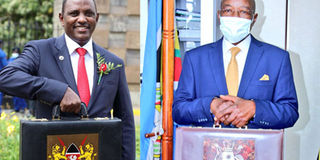Kenya’s budget up, Uganda’s trimmed

Kenya's Treasury and National Planning cabinet secretary, Ukur Yatani and Uganda's state minister for finance Mr Amos Lugoobi pictured before they presented FY 2021/22 national budgets for their respective countries on June 10. PHOTO/COMBO
What you need to know:
- In Uganda, the government is bringing its 2021/22 budget down by Ush714 billion to Ush44.7 trillion compared to what the country’s Parliament approved last year.
Kenya and Uganda June 10 joined Tanzania in the normal arrangement by partner states of the East African Community (EAC) to table their national budgets on the same day.
Kenya is raising its budget by Ksh1.7 trillion in the 2020/21 financial year compared to Ksh3.66 trillion in the 2021/22 financial year- to partly cater to economic challenges brought about by the Covid-19 pandemic.
In Uganda, the government is bringing its 2021/22 budget down by Ush714 billion to Ush44.7 trillion compared to what the country’s Parliament approved last year.
Presenting the 2021/22 financial budget at Parliament Buildings yesterday, Kenya’s Treasury Secretary Ukur Yatani said the last budget under President Uhuru Kenyata’s administration was to raise the hopes of a nation seeking relief from the economic shock of the Covid-19 pandemic.
Mr Yatani said the government had set aside Ksh142.1 billion in the Financial Year 2021/22 budget for implementation of priority programmes under the Big Four Agenda.
He also set aside Ksh27.2 billion to support Nairobi Metropolitan Services to continue performing its functions.
Another Ksh27.2 billion was set aside for the construction of SGR Phase II (Nairobi Naivasha), and another KSh7.5 billion for the Lapsset project.
A total of Ksh14.3 billion is also set aside for Covid-19 vaccination and other preventive measures.
“Fighting against the pandemic, Kenya joins hands with other East African Community (EAC) member states to offer duty free to imported raw materials and inputs for manufacturing masks, sanitiser, ventilators and personal protective equipment,” he noted.
In the education sector, Ksh12 billion has been set aside for free primary education where the Competency Based Curriculum will get Ksh1 billion while Ksh2.5 billion will be spent on the hiring of more teachers. The Teachers Service Commission will get Ksh281.7 billion while Ksh15.8 billion will go to the Higher Education Loans Board.
To protect local manufacturers from cheaper imports, Mr Yatani said that finished iron and steel products will be imported at 25 percent excise duty.
The inputs for the manufacture of baby diapers, he said, will remain at zero percent under duty remission scheme.
Mr Yatan proposed to reintroduce excise duty on betting at 20 percent of the stake amount.
The Treasury handed legislators Ksh46.61 billion, a generous 25 per cent increase compared to the Ksh37.3 billion in the current year. The allocation makes Parliament one of the biggest winners in Yatani’s second budget
The Judiciary, the third arm of government, will receive Ksh17.92 billion in the new financial year, a marginal rise from the current Ksh17.7 billion. The allocations come at a time when the Judiciary, which has a workforce of approximately 5,000, has been lamenting about budget cuts.
In Uganda, the newly-appointed Minister of State for Planning, Mr Amos Lugoloobi, said the budget will be implemented by domestic revenue by 76.7 percent and external revenue by 23.3 percent.
“Our domestic revenue is projected to be USh22.425 trillion while domestic borrowing being USh2.943 trillion,” he said.
The government will also source revenues of USh200 billion from the Petroleum Fund and another USh3.583 trillion from budget support.
External financing for projects, he said, will be USh6.868 trillion while appropriation in Aid stands at USh212.4 billion and the domestic debt refinancing, USh8.547 trillion.
Of the budget, USh6.9 trillion has been provided for Peace, security and good governance.
“The funds are for refurbishing and maintaining military equipment, complete construction of a military referral hospital in Mbuya and commence construction of 30,000 housing units for the military,” he noted.
The Ministry added that USh134.9 billion has been allocated in the budget for FY 2021/22 to enhance digitization of the economy while USh7.7 trillion has been allocated to enhance human capital development.
“Our budget focuses much on restoring the economy back to a medium term growth path, improving wellbeing of the population to ensure health and a skilled workforce and providing peace, security and good governance,” he said.
*Written by Alfred Zacharia



